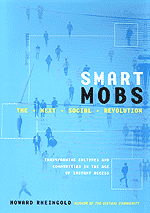"I looked at my phone and the answer seemed obvious,"
SMART MOBS, by Howard Rheingold (アメリカ) (an excerpt)
(an excerpt)
In the fall of 2001, I visited the office of ImaHima in Tokyo's ultra-modern Ebisu Garden Place Tower. ImaHima founder, Neeraj Jhanji, was the only person in the office on a Saturday morning. The DoCoMo skyscraper I had visited the day before was visible through the window. Neeraj, twenty-nine, a native of India, remained in Tokyo after a stint with an international consulting firm. One sunny Saturday, walking alone in one of Tokyo's most popular and crowded districts, he wondered if any of his friends were nearby. "I looked at my phone and the answer seemed obvious," he told me. Even without GPS location awareness, it would be possible to use the Internet to coordinate locations. At the time I spoke to Jhanji, ImaHima had won the prestigious Prix Arts Electronica, had been adopted as an official i-mode site, and had gained 250,000 users with a median age of twenty-five. ImaHima was planning to launch in European markets by 2002.
 Jhanji showed me how the service works. When you join, you fill out a profile and set up a buddy list similar to the kind used with Internet instant messaging; each person must give permission before someone else can know automatically where they are. You also list your favorite places. When you select the "update" link on your mobile's ImaHima menu, everyone on your buddy list knows, for example, that you are within a few blocks of Shibuya station and are free for lunch.
Jhanji showed me how the service works. When you join, you fill out a profile and set up a buddy list similar to the kind used with Internet instant messaging; each person must give permission before someone else can know automatically where they are. You also list your favorite places. When you select the "update" link on your mobile's ImaHima menu, everyone on your buddy list knows, for example, that you are within a few blocks of Shibuya station and are free for lunch.
The just-in-time, just-in-place matchmaking service for strangers, an intriguing aspect of ImaHima, is also where the most caution is required. With young women in Tokyo being targeted on the street by solicitors for "hostess bars," no service could hope to attract any females without strict controls--nor would DoCoMo's strict policies allow a service to become a lucrative official i-mode site. "You can search through the list of your friends," Jhanji told me, "or you can ask permission to contact a stranger whose profile matches your request and who is nearby. But if you request permission to communicate and the other person denies your request, the system blocks you from communicating with that person again."
- Howard Rheingold
Amazon
